|
|
|
Sort Order |
|
|
|
Items / Page
|
|
|
|
|
|
|
| Srl | Item |
| 1 |
ID:
127501
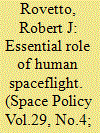

|
|
|
|
|
| Publication |
2013.
|
| Summary/Abstract |
The question is: should the United States and nations at large pursue a human spaceflight program (and if so, why)? I offer an unwavering positive answer to this question, and state the reasons for it while considering the broad challenges and benefits of (human) spaceflight. Space exploration is a human activity that is intrinsically forward-looking, and as such, has positive potential. Both national and international space programs can galvanize the population, inspire the youth, foster job-creation, and motivate the existing workforce. The nature of the enterprises involved-their scale, novelty, and complexity-requires a steady and continuous upward progression toward greater societal, scientific and technological development. That is, in order to overcome the challenges of human spaceflight, progress is required. More to the point, the survival of humanity depends on expanding beyond the confines of our planet. Human spaceflight, in short, presents us with an opportunity to significantly advance the nation and the global community.
|
|
|
|
|
|
|
|
|
|
|
|
|
|
|
|
| 2 |
ID:
058819


|
|
|
| 3 |
ID:
096459


|
|
|
| 4 |
ID:
148486
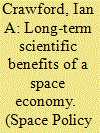

|
|
|
|
|
| Summary/Abstract |
Utilisation of the material and energy resources of the Solar System will be essential for the development of a sustainable space economy and associated infrastructure. Science will be a major beneficiary of a space economy, even if its major elements (e.g. space tourism, resource extraction activities on the Moon or asteroids, and large-scale in-space construction capabilities) are not developed with science primarily in mind. Examples of scientific activities that would be facilitated by the development of space infrastructure include the construction of large space telescopes, ambitious space missions (including human missions) to the outer Solar System, and the establishment of scientific research stations on the Moon and Mars (and perhaps elsewhere). In the more distant future, an important scientific application of a well-developed space infrastructure may be the construction of interstellar space probes for the exploration of planets around nearby stars.
|
|
|
|
|
|
|
|
|
|
|
|
|
|
|
|
| 5 |
ID:
074788
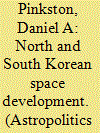

|
|
|
|
|
| Publication |
2006.
|
| Summary/Abstract |
North and South Korea both have developed rocket technology for military and civilian applications, but their space programs differ in many important aspects. As late developing space powers, neither country poses a serious direct threat to U.S. space assets, but a successful U.S. cooperative engagement strategy towards the Koreas could help achieve U.S. policy objectives. The domestic politics of the two Koreas are very different, and Korean space development will depend upon a number of variables including inter-Korean relations and whether the two Koreas unify, domestic politics and budget constraints, the overall strategic environment, as well as opportunities for Korea in the realm of international space cooperation. The United States has opportunities to implement an engagement strategy in Korea, but it could be complicated by different U.S. objectives in North and South Korea, and by linkage to other issues. Despite the complexities, Washington should be prepared for a number of possibilities.
|
|
|
|
|
|
|
|
|
|
|
|
|
|
|
|
| 6 |
ID:
096172
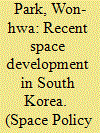

|
|
|
|
|
| Publication |
2010.
|
| Summary/Abstract |
Despite some setbacks - notably an indigenous launch failure - progress is being made in South Korea's space program and its public image has been boosted by the first flight of a Korean astronaut to the ISS. This report provides an update on recent and forthcoming space activities in the country and on its current cooperative arrangements.
|
|
|
|
|
|
|
|
|
|
|
|
|
|
|
|
| 7 |
ID:
148489
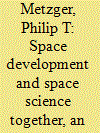

|
|
|
|
|
| Summary/Abstract |
The national space programs have an historic opportunity to help solve the global-scale economic and environmental problems of Earth while becoming more effective at science through the use of space resources. Space programs will be more cost-effective when they work to establish a supply chain in space, mining and manufacturing then replicating the assets of the supply chain so it grows to larger capacity. This has become achievable because of advances in robotics and artificial intelligence. It is roughly estimated that developing a lunar outpost that relies upon and also develops the supply chain will cost about 1/3 or less of the existing annual budgets of the national space programs. It will require a sustained commitment of several decades to complete, during which time science and exploration become increasingly effective. At the end, this space industry will capable of addressing global-scale challenges including limited resources, clean energy, economic development, and preservation of the environment. Other potential solutions, including nuclear fusion and terrestrial renewable energy sources, do not address the root problem of our limited globe and there are real questions whether they will be inadequate or too late. While industry in space likewise cannot provide perfect assurance, it is uniquely able to solve the root problem, and it gives us an important chance that we should grasp. What makes this such an historic opportunity is that the space-based solution is obtainable as a side-benefit of doing space science and exploration within their existing budgets. Thinking pragmatically, it may take some time for policymakers to agree that setting up a complete supply chain is an achievable goal, so this paper describes a strategy of incremental progress. The most crucial part of this strategy is establishing a water economy by mining on the Moon and asteroids to manufacture rocket propellant. Technologies that support a water economy will play an important role leading toward space development.
|
|
|
|
|
|
|
|
|
|
|
|
|
|
|
|
|
|
|
|
|